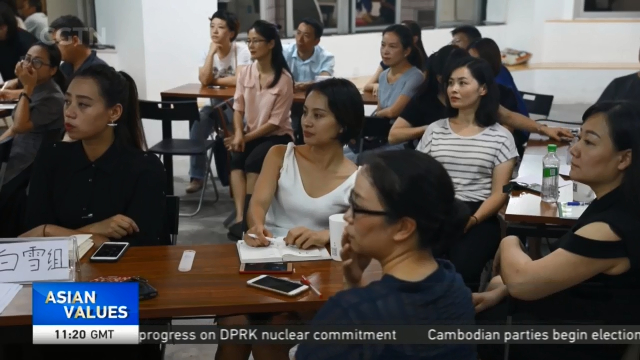
19:57, 07-Jul-2018
Better Education: Parents, teachers in China not merely eyeing scores
Updated
19:28, 10-Jul-2018
05:18

For many students in China, the gaokao, or college entrance exam, is a make or break experience. Talent, luck, and mostly, years of hard work are what's required to get a good result. However, it seems like now, more and more parents and educators are not just focusing on test scores. Tao Yuan has the story.
Back when Cui Tao was a student, he never imaged school could be like this. He now teaches gaming at an innovative school called Pioneer Education, based in southwest China. By playing 'King of Glory', a wildly popular online battle game, Cui helps his students develop the ability to form tactics and strategy. His own education was different.
CUI TAO VICE PRESIDENT, PIONEER EDUCATION SCHOOL "There wasn't a single day when we didn't study till very late. Many went to cram schools or participated in competitions to improve their grades."
Here's why - China's college entrance test, or gaokao, is dubbed by some as "the world's toughest exam". After years of studying and almost unbearable pressure, the final test score can determine which college you go to, or even affect career and marriage prospects. They say "golden mansions can be found in books", a proverb that dates back to imperial China. When it comes to shaping a young person's future, good grades seem to matter more than any other quality. Cui went to one of China's best universities. But he says he's merely a survivor of the gaokao system, not a beneficiary.
CUI TAO VICE PRESIDENT, PIONEER EDUCATION SCHOOL "There were many problems. For example, my students are encouraged to form their own opinions on things. But my generation didn't have that."
So now a change of heart for many Chinese families - China's modern economy is creating a growing middle class. More parents now want a better life experience for their children, rather than simply better schools and jobs. Li Tong knew early on that traditional education wasn't for her son.
LI TONG YAN XIAOHAN'S MOTHER "He's full of ideas. He does well in some subjects, but not so much in others. For a child like him, if he wants to excel, China's current education system is not suitable, because there are too many restrictions."
Her son, Yan Xiaohan, is now a senior at Pioneer, and has secured a place in a college in the U.S. He's waiting to start his studies there.
YAN XIAOHAN STUDENT, PIONEER EDUCATION SCHOOL "Life here has more choices. I don't need to care about the schedules, or plans designed by teachers. For me, I can learn more things I like."
TAO YUAN CHENGDU "There's no set curriculum, the students are not even required to come to school. Education here is based on the children's hobby and preference. Schools like this one represent a tiny but growing trend in China's education reform."
Not just in schools. Oxford-graduate educator Tong Xin trains parents on problem-based learning. She says more are taking up a new model of parenting.
Li Tong is certainly a gardener parent. But outside the home, she's the president of a public elementary school. Most of her students are children of China's internal migrants - underprivileged farmers who moved to a city to look for work.
LI TONG YAN XIAOHAN'S MOTHER "I've come into contact with too many students whose entire family sleeps on the same bed. Everything they do - dining, sleeping, studying, takes place in one single room. For these students, public education is the only way because it's free, it's efficient, and if they get good grades, their fate might change."
A meritocracy Li believes in. But she also wants better for her students.
LI TONG YAN XIAOHAN'S MOTHER "Teachers in the past were trained using current knowledge to teach people of the future, so education never really fulfills the needs of the future. But there are still passionate educators and parents exploring all possibilities and breaking boundaries."
Believing children like her son are so much more than just a test score. TY, CGTN, Chengdu.

SITEMAP
Copyright © 2018 CGTN. Beijing ICP prepared NO.16065310-3
Copyright © 2018 CGTN. Beijing ICP prepared NO.16065310-3